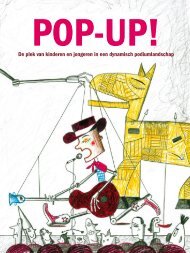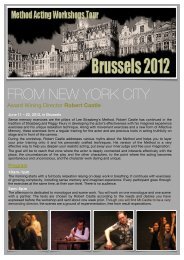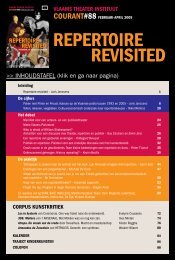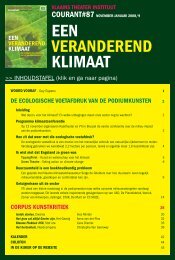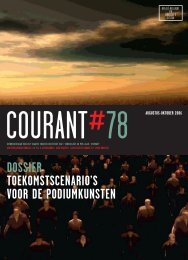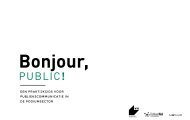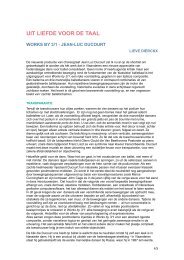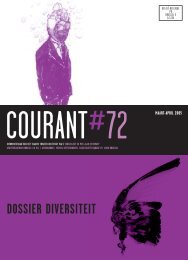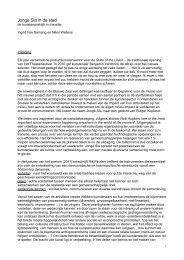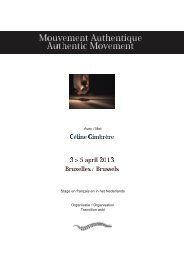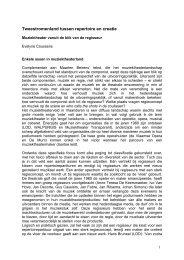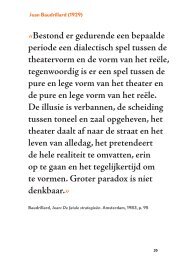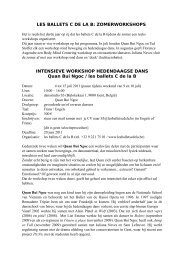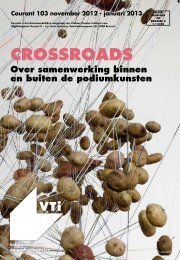music theatre in flanders - Muziekcentrum Vlaanderen
music theatre in flanders - Muziekcentrum Vlaanderen
music theatre in flanders - Muziekcentrum Vlaanderen
Create successful ePaper yourself
Turn your PDF publications into a flip-book with our unique Google optimized e-Paper software.
In turn, <strong>music</strong> students, struck by the magic of <strong>music</strong> an sich,<br />
will develop little awareness of the mean<strong>in</strong>g and impact on <strong>music</strong><br />
of lyrics, libretto and, even less perhaps, of theatrical and rhetorical<br />
effects. Literature, poetry and rhetoric are all right, but let us,<br />
above all, enjoy mak<strong>in</strong>g <strong>music</strong>! And once they practice their profession,<br />
most <strong>music</strong>ians will show little <strong>in</strong>terest <strong>in</strong>, for <strong>in</strong>stance,<br />
theatrical elements <strong>in</strong> <strong>music</strong>. Because they were simply never<br />
taught how to deal with them.<br />
The FATA MOrGAnA<br />
Still, <strong>music</strong> and <strong>theatre</strong> are children <strong>in</strong> one and the same family.<br />
Whatever the style, <strong>music</strong> is a language, with its grammar and<br />
rules, with a syntax and its proper rhetoric, form and diction. Language<br />
and <strong>theatre</strong> use the same parameters as <strong>music</strong>: melody,<br />
rhythm, timbre, dynamics, articulation... Both discipl<strong>in</strong>es only really<br />
exist when they are imbued with craftsmanship and the joy of<br />
perform<strong>in</strong>g <strong>in</strong> a mature performance practice.<br />
The basis of communication is explor<strong>in</strong>g one’s own and the<br />
other’s limits, gett<strong>in</strong>g off one’s little island. The danger for word<br />
and <strong>music</strong> students is that they stick to sunbath<strong>in</strong>g on their own<br />
little heavenly island far too often. Still, the gap is not really that<br />
deep, the water is far less turbulent than it seems. Explor<strong>in</strong>g each<br />
other’s island with <strong>in</strong>terest proves fruitful for both...<br />
MuSIC In drAMA TrAInInG<br />
Broad and profound <strong>music</strong> <strong>in</strong>terpretation is the basis for any <strong>music</strong>al<br />
tra<strong>in</strong><strong>in</strong>g <strong>in</strong> drama. In my <strong>music</strong> lessons for <strong>in</strong>strument makers<br />
at ILSA, I have a very heterogeneous group of students, whom<br />
I br<strong>in</strong>g together through <strong>music</strong>: the classical <strong>music</strong>ian who has<br />
had ten years of tra<strong>in</strong><strong>in</strong>g and the pierced backyard garage rock ‘n<br />
roll player who is driven by enthusiasm. And it works, simply by<br />
hav<strong>in</strong>g them listen to a rich variety of <strong>music</strong>. They are offered listen<strong>in</strong>g<br />
methods and attitudes which they eagerly assimilate and<br />
which help them learn to appreciate each other’s <strong>music</strong>. From<br />
then on, the ice is broken and they will beg<strong>in</strong> to collaborate. For<br />
<strong>music</strong>ally untra<strong>in</strong>ed drama students, such a guided promenade<br />
through the rich variety of <strong>music</strong> can be a true trip. In my op<strong>in</strong>ion,<br />
it is equally obvious to explore all possible relations between text<br />
and <strong>music</strong> thoroughly through songs, standards, cantatas, operas<br />
and libretti... Guided listen<strong>in</strong>g and theoretical formation have to<br />
be part of the student’s <strong>music</strong>al liv<strong>in</strong>g environment.<br />
Such nutrient will deliver rich fertile soil for more technical<br />
and practical <strong>music</strong> courses <strong>in</strong> which mak<strong>in</strong>g <strong>music</strong> rema<strong>in</strong>s the<br />
focus of attention: solfeggio, vocalization, s<strong>in</strong>g<strong>in</strong>g, composition<br />
and arrangement, perform<strong>in</strong>g. For these students, mak<strong>in</strong>g <strong>music</strong><br />
is not self-evident. Some do play an <strong>in</strong>strument, some have<br />
some experience with ensemble, but many have neither. With<strong>in</strong><br />
the framework of a drama course, it is difficult to make room for<br />
profound <strong>music</strong> performance tra<strong>in</strong><strong>in</strong>g. That is why collaboration<br />
with, for <strong>in</strong>stance, <strong>music</strong> students, can be a useful solution.<br />
Still, it is clear that separate <strong>music</strong> tra<strong>in</strong><strong>in</strong>g with<strong>in</strong> the framework<br />
of a drama course is impossible to achieve. Music’s added<br />
value with<strong>in</strong> a theatrical framework has to be reflected and acknowledged<br />
<strong>in</strong> all other courses. It should be possible to comb<strong>in</strong>e<br />
and tra<strong>in</strong> theoretical and practical aspects on a regular basis, <strong>in</strong><br />
comb<strong>in</strong>ation with word and drama with<strong>in</strong> the performance and<br />
presentation practice itself. For the students, this practice creates<br />
moments to work up to. Confrontations with an audience will<br />
help them ga<strong>in</strong> the experience – also on a <strong>music</strong>al level – that is<br />
required to develop craftsmanship and to master the trade.<br />
76 77<br />
table of contents



